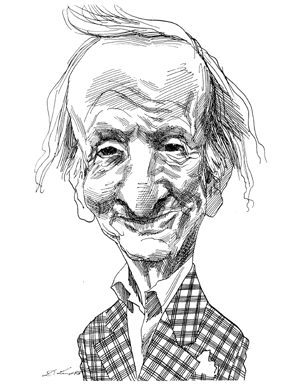The Magician’s Wife comes on like an old French costume movie, perhaps by Marcel Carné. Danielle Darrieux would play the heroine, Jean-Louis Barrault her husband, and Charles Boyer, if he could be persuaded to make a cameo appearance, the dashing Colonel Deniau. The film has to be French, because the story is set first at the court of Napoleon III and then in half-colonized Algeria. The background for the first part is Winterhalter, with jewels glittering and court uniforms ablaze with medals; for the second part it is lushly orientaliste, all galloping hooves, flying burnooses, and silken cushions heaped on rich rugs.
The jacket says that Brian Moore based his story “on an actual historical incident.” He has often done that before: his last novel, The Statement, for instance, was about the French Nazi Paul Touvier, and No Other Life was about President Aristide of Haiti. The Magician’s Wife is set further back in time, but it is quite topical in view of recent events in Algeria. In the autumn of 1856 the French were planning to extend their conquest of the country southward with a campaign set for the following spring. The project is threatened by an uprising reported to be imminent in the region. A Muslim holy man, the marabout Bou-Aziz, is to be proclaimed Mahdi and will lead a jihad against the French. Holy men were supposed to be able to perform miracles, or at least magic. So a clever French Arabist, called Colonel Deniau in the novel, has the idea of getting a famous magician to perform before the Algerians. Henri Lambert’s skill is such that he will be able to persuade them that no Mahdi could stand up to his powers—that Christian magic is stronger than Muslim magic. The rebels will therefore abandon the idea of rebellion. Lambert is to be the French secret weapon.
To flatter him into agreeing, and also to persuade the emperor of the showman’s fitness for the undertaking, Deniau arranges for Lambert and his attractive young wife, Emmeline, to be invited to Compiègne for an imperial hunting and shooting party. The série goes on for seven days, and every event in it—meets, battues, luncheons, dinners, balls—is painstakingly described. So are Emmeline’s toilettes, a different one for every occasion, and all designed by Worth (disguised as West). While she takes along a lady’s maid specially hired to do her hair in unprecedentedly becoming coiffures, she is chronically anxious about her appearance. There is a less frivolous side to her character though: the conspicuous consumption at the imperial court disgusts her as much as the emperor’s persistent groping; while the killing of thousands of birds makes her literally sick. She is politically correct before her time.
Deniau’s plan succeeds: the Lamberts’ visit to Algeria is arranged, and he has flirted so heavily with Emmeline that she has fallen for him and expects to become his lover once they get to Africa. This is not as shocking as it may seem: ever since Emmeline’s second miscarriage, the Lamberts’ marriage has been blanc.
Psychologically, these maneuvers are not very convincing anyway; but then, this is not a psychological novel. It is part exotic travel yarn, part thriller, part anticolonial tract, and part reflection on religious belief, a major theme in many of Moore’s novels. The principals have just enough characteristics each to make the plot work, which it does extremely well. Emmeline’s are prettiness, dash, and decency, even high-mindedness. A doctor’s daughter from Rouen, she comes from an enlightened family, and hasn’t much respect for her husband’s profession. As for Lambert, Moore tells us nothing about his past before he became famous, and he is characterized only by his genuine love for Emmeline and a passionate professional perfectionism, fueled by ambition—which inclines him to neglect her. However, in Algeria he becomes a hero by behaving heroically.
After a virtuoso performance before Bou-Aziz and the important sheiks of southern Algeria, one of them challenges him to a public duel. Lambert announces that his opponent’s bullet will not be able to harm him. Whether he will really be able to deflect it under conditions quite unsuitable for the performance—in an open courtyard instead of in a theater—is uncertain, even for Lambert himself. Moore builds up the tension before the performance with a brilliant description of the knife-edge technical preparations for it. The reader becomes the audience and holds his breath; and Lambert succeeds, appearing to catch the sheik’s bullet between his teeth. The sheik is humiliated, the Arabs alarmed, the French triumphant. Two days later a young fanatic shoots at Lambert and wounds him in the shoulder. Lambert heroically conceals his pain: he has to be seen to be invulnerable in order to prove that Christianity is stronger than Islam. But his right arm is paralyzed, and his career ruined. The Légion d’honneur is not quite sufficient compensation.
Advertisement
This is not a first-person narrative, but everything in the novel is described from Emmeline’s point of view. She soon sees through Deniau’s flirtation as merely a means to get her to support his plans. She also sees through the hypocrisy of the French who talk about civilizing the Arabs and raising their standard of living when they think only of enlarging their own empire. The Muslim faith impresses her: “Never in France, in cathedral, convent, or cloister, had she felt the intensity of belief everywhere present….” Every Muslim prays five times a day, and “they don’t ask for favors, or daily bread, for forgiveness of trespasses, deliverance from temptation and evil. All they ask is God’s help to guide them in the right path. Isn’t that what all of us should ask?” Emmeline is also touched by Bou-Aziz and by his daughter, who interprets for him: their gentleness, courtesy, and dignity contrast favorably with Lambert’s braggadocio and Deniau’s smooth cynicism. At one point, Bou-Aziz’s face strikes her “as the bruised visage of the crucified Christ imprinted on the shroud of Turin.”
Deeply moved and attracted as she is by the faith of the Muslims, Emmeline decides that “this world of total fervor, of blind resignation was one she neither could nor would wish to enter.” So she sails for France with her husband. She is not unlike the heroine in Brian Moore’s earlier novel Cold Heaven, an angry lapsed Catholic whose husband’s life is saved by a vision of the Virgin, which she herself witnesses, but refuses to acknowledge. Moore prowls around the edges of belief, examining its rejection, its neglect, its failure to work, without concealing his admiration and respect for it. His angle is more oblique and equivocal than Graham Greene’s, to whom he is sometimes compared. He does not let on whether he himself is a believer, a would-be believer, or an agnostic; and his ambiguity, like an undisclosed secret, engenders the serious dramatic tension (as opposed to the narrative thrills) in his novels.
This Issue
January 15, 1998




